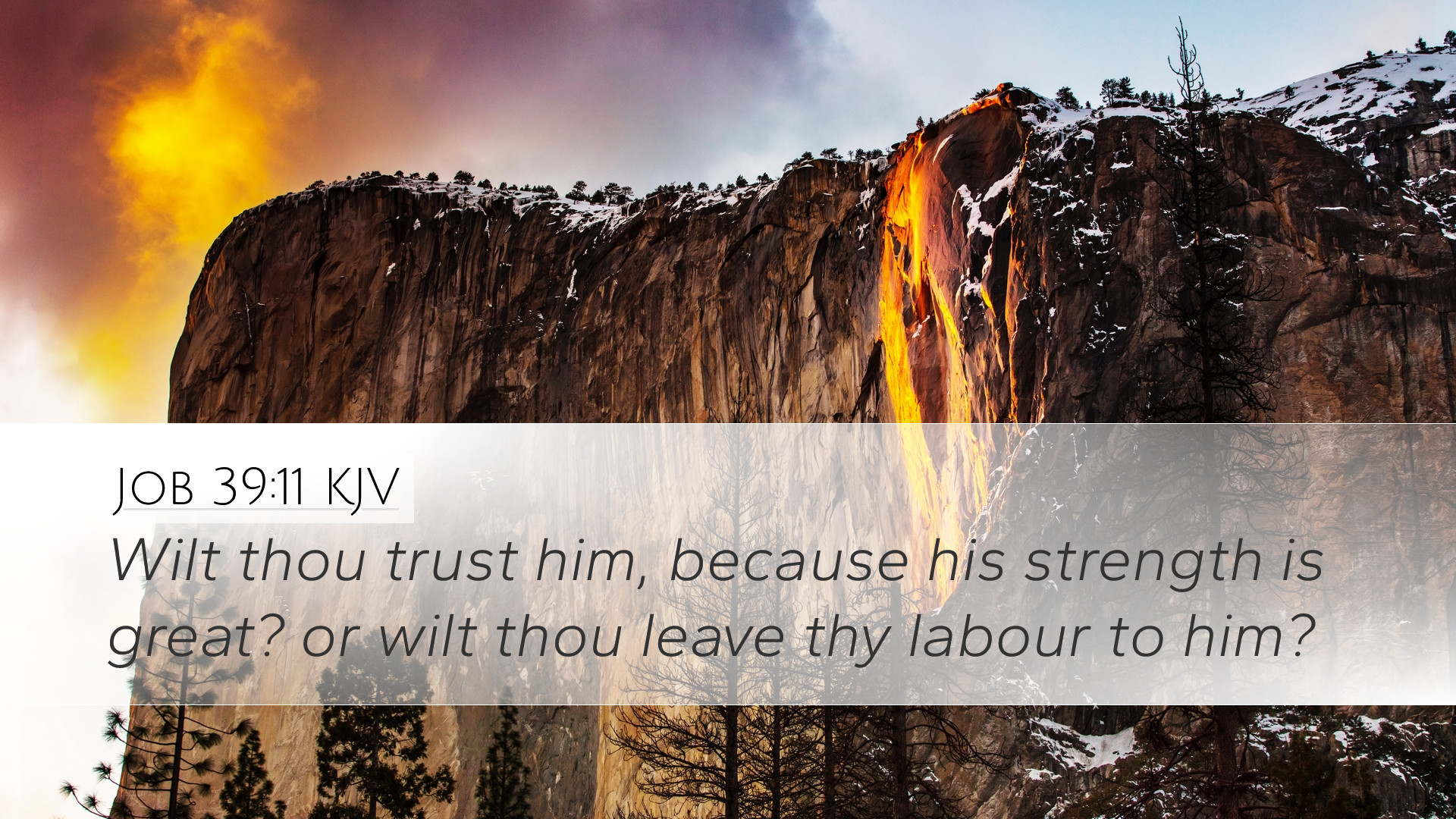Old Testament
Genesis Exodus Leviticus Numbers Deuteronomy Joshua Judges Ruth 1 Samuel 2 Samuel 1 Kings 2 Kings 1 Chronicles 2 Chronicles Ezra Nehemiah Esther Job Psalms Proverbs Ecclesiastes Song of Solomon Isaiah Jeremiah Lamentations Ezekiel Daniel Hosea Joel Amos Obadiah Jonah Micah Nahum Habakkuk Zephaniah Haggai Zechariah MalachiJob 39:11
Job 39:11 KJV
Wilt thou trust him, because his strength is great? or wilt thou leave thy labour to him?
Job 39:11 Bible Commentary
Commentary on Job 39:11
Job 39:11 reads: "Will you trust him because his strength is great? Or will you leave your labor to him?" This verse emerges from a larger discourse in the book of Job, where God is speaking to Job out of the whirlwind, highlighting the understanding of divine power and human limitations.
Contextual Overview
The context of Job 39 focuses on God's challenge to Job to consider the works of creation and the wisdom embedded within them. Here, God points out the might of the wild and untamed creatures and monumental forces of nature, drawing a contrast between divine sovereignty and human frailty.
The Divine Inquiry
God's question to Job serves not merely as an inquiry into Job's thoughts on His power but also challenges Job's understanding of trust and reliance on divine providence. This reflects a common theme in Job's story—his struggle with understanding God’s justice and the suffering he endured.
Insights from Public Domain Commentaries
Matthew Henry's Commentary
According to Matthew Henry, this verse signifies the exaltation of God's omnipotence and invites readers to recognize the futility of expecting human strength to compare with His. Henry emphasizes that God's command over the natural world, including the beasts, illustrates that He does not depend on human effort to achieve His purposes. His work continues forward independent of human participation.
- Divine Sovereignty: God reigns supreme over creation.
- Human Limitations: There is a notable impotence in human effort when juxtaposed with divine power.
- Trust in God: The ultimate reliance should be on God's strength, not our capabilities.
Albert Barnes' Exposition
Albert Barnes sheds light on the rhetorical nature of this question. He posits that it highlights the absurdity of expecting the mighty creatures, such as the lion or horse, to respond to human commands merely because of their size or power. Barnes argues that this verse underlines the distinction between God’s authority as Creator and man’s limited jurisdiction over creation.
- Trusting God’s Strength: Can humans control the beasts of burden? This speaks to the idea that we should entrust our difficulties to God, whose strength is incomparable.
- Call to Humility: Recognizing our limits can lead to greater humility and reliance on God's guidance.
- Reflection on Labor: The latter part of the verse prompts us to consider the nature of our labor—is it done in faith and reliance on God?
Adam Clarke's Commentary
Adam Clarke interprets this verse by examining the nature of work and effort. He suggests that human beings often toil with a sense of self-sufficiency, forgetting their dependence on God. Clarke warns against the idea of leaving our labors solely to God’s strength without active participation of faith, which demonstrates our partnership in creation.
- Balance of Divine and Human Efforts: God’s might does not diminish our responsibility to act.
- Faith in God’s Provision: This verse teaches the importance of aligning our efforts with divine will.
- The Essence of Labor: Our actions should stem from faith, expressing trust in God's guidance and strength.
Theological Reflections
From the insights gathered, it becomes clear that Job 39:11 serves as a powerful meditation on God's omnipotence juxtaposed with human limitation. Pastors and theologians may draw several implications:
- Understanding Providence: The complexity of divine nature invites believers to pursue a deeper understanding of God’s providence in their lives.
- Encouragement in Suffering: Job’s experience reminds individuals enduring hardship that their trust should lie in God’s strength, not their own.
- Call for Action: While divine strength is paramount, humans are called to act with faith, embracing their responsibility while relying on God's support.
Conclusion
Job 39:11 encapsulates a timeless truth about the relationship between divine omnipotence and human frailty. Insight from commentators emphasizes the importance of recognizing our limitations and placing our trust in God's unrivaled strength. For pastors, students, and theologians, this verse challenges individuals to embrace a posture of humility and dependence while encouraging active participation in God's work on earth.


